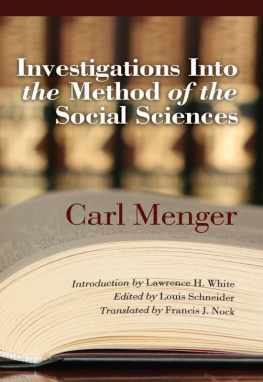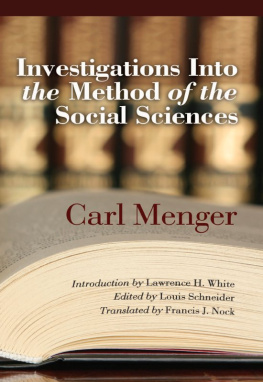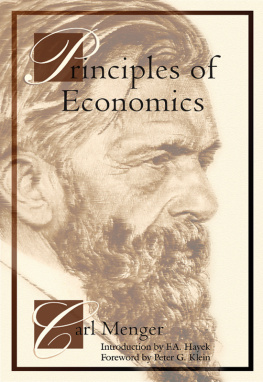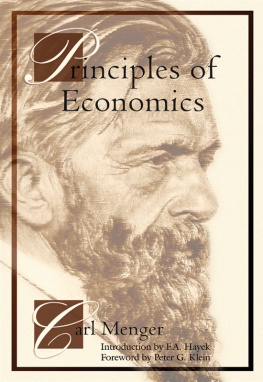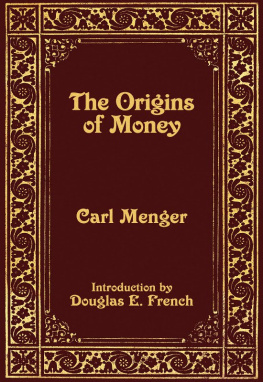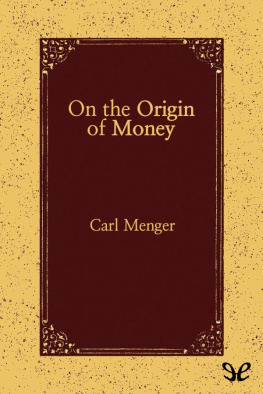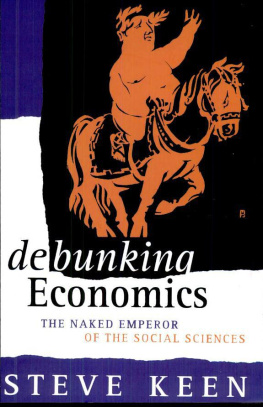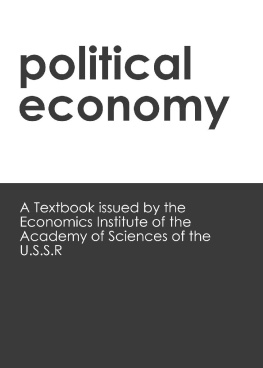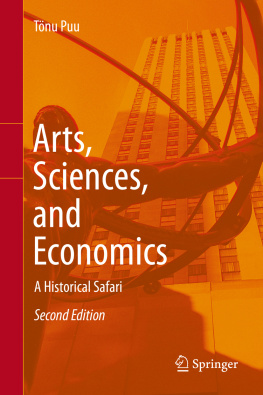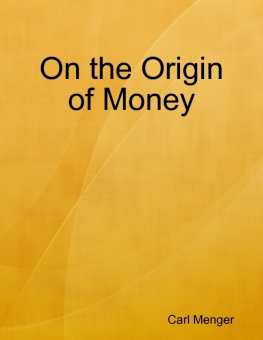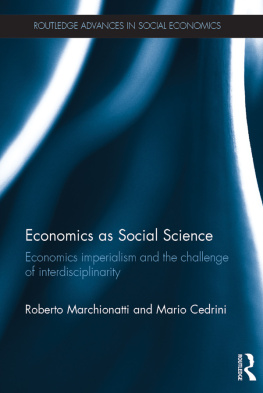INVESTIGATIONS INTO THE METHOD
OF THE SOCIAL SCIENCES
WITH SPECIAL REFERENCE TO ECONOMICS
The Institute for Humane Studies Series in Economic Theory
Distributed by New York University Press
1. Americas Great Depression, by Murray N. Rothbard (1975)
2. The Economic Point of View: An Essay in the History of Economic Thought by Israel M. Kirzner (1976)
3. The Foundations of Modern Austrian Economics edited with an introduction by Edwin G. Dolan (1976)
4. The Economics of Ludwig von Mises: Toward a Critical Reappraisal edited with an introduction by Laurence S. Moss (1976)
5. Economics as a Coordination Problem: The Contributions of Friedrich A. Hayek by Gerald P. ODriscoll, Jr. (1977)
6. Capital, Interest, and Rent: Essays in the Theory of Distribution by Frank A. Fetter, edited with an introduction by Murray N. Rothbard (1977)
7. Capital, Expectations, and the Market Process: Essays on the Theory of the Market Economy by Ludwig M. Lachmann, edited with an introduction by Walter E. Grinder (1977)
8. Power and Market: Goverment and the Economy by Murray N. Rothbard (1977)
9. Liberalism: A Socio-economic Exposition by Ludwig von Mises with a foreword by Louis M. Spadaro (1978)
10. Man, Economy, and State: A Treatise on Economic Principles by Murray N. Rothbard (1978)
11. New Directions in Austrian Economics edited with an introduction by Louis M. Spadaro (1978)
12. The Ultimate Foundation of Economic Science: An Essay on Method by Ludwig von Mises, with a foreword by Israel M. Kirzner (1978)
13. Capital and Its Structure by Ludwig M. Lachmann (1978)
Published by New York University Press
1. Epistemological Problems of Economics by Ludwig von Mises, translated by George Reisman with a foreword by Ludwig M. Lachmann (1981)
2. L.S.E. Essays on Cost, edited by J. M. Buchanan and G. F. Thirlby (1981)
3. Principles of Economics by Carl Menger, translated by James Dingwall and Bert F. Hoselitz with an introduction by F. A. Hayek (1981)
4. Nation, State, and Economy: Contributions to the Politics and History of Our Time by Ludwig von Mises, translated and with an introduction by Leland B. Yeager (1983)
5. Investigations into the Method of the Social Sciences with Special Reference to Economics by Carl Menger, edited by Louis Schneider with an introduction by Lawrence H. White, translated by Francis J. Nock (1985)
CARL MENGER
INVESTIGATIONS INTO THE METHOD OF THE SOCIAL SCIENCES WITH SPECIAL REFERENCE TO ECONOMICS
Formerly published under the title:
PROBLEMS OF ECONOMICS
AND SOCIOLOGY
(Untersuchungen ber die Methode der Socialwissenschaften und der Politischen Oekonomie insbesondere)
WITH A NEW INTRODUCTION
BY LAWRENCE H. WHITE
EDITED BY LOUIS SCHNEIDER
TRANSLATED BY FRANCIS J. NOCK
NEW YORK UNIVERSITY PRESS
NEW YORK AND LONDON
1985

1963 by the Board of Trustees of the University of Illinois Introduction by Lawrence H. White 1985 by New York University
Library of Congress Cataloging in Publication Data
Menger, Karl, 18401921.
Investigations into the method of the social sciences, with special reference to economicsformerly published under title, Problems of economics and sociology.
(The Institute for Humane Studies series in economic theory)
Translation of: Untersuchungen ber die Methode der Socialwissenschaften, und der politischen Oekonomie insbesondere.
Bibliography: p.
1. Economics. 2. Economic policy. 3. Social sciences. I. Schneider, Louis, 1915
II. Title. III. Title: Problems of economics and sociology. IV. Series: Studies in economic theory.
HB175.M48153 1985 330.072 858918
ISBN 0-8147-5396-5 (alk. paper)
ISBN 0-8147-5397-3 (pbk.: alk. paper)
Clothbound editions of New York University Press books are Smythsewn and printed on permanent and durable acid-free paper.
Manufactured in the United States of America
TABLE OF CONTENTS
INTRODUCTION TO THE NEW YORK UNIVERSITY PRESS EDITION
It is a rare book in economics that deserves to be translated into English as much as eighty years after its initial publication. The book that actually receives such attention after so many years almost ipso facto qualifies as a classic.), for there is no doubt about its preeminence as a treatment of vital methodological issues in economics. When this translation fell out of print in recent years, the Institute for Humane Studies and the New York University Press became naturally eager to reissue it as part of their series of Studies in Economic Theory. This series includes the 1981 edition of Mengers only other book-length work, Principles of Economics, which was first published in 1871. Thus the Investigations takes its well-deserved place alongside the Principles as a classic of economic thought enjoying a second century of life in a new language.
The republication of the Investigations today is especially appropriate in light of the interest that economists have recently been taking in this work, in the writings of Carl Menger generally, and (still
Much more evidence of Mengerian scholarship appears outside the narrow confines of the journals, in recent books and monographs by members and critics of the modern Austrian School. The direct influence of Mengers Investigations on F. A. Hayek, noted by Schneider (pp. 12, 16) with particular regard to The Constitution of Liberty, continues to be evident in Hayeks more recent Law, Legislation, and Liberty, particularly the first volume of this triology. In criticizing the view that such social institutions as law, language, money, and markets were deliberately designed or rationally constructed, Hayek comments that the Investigations contains still the best earlier treatment of these problems.
Mengers insight into the spontaneous character of economic and social orders has also had an unmistakable importance for other Austrian economists. Ludwig M. Lachmann, the second prominent elder statesman of the Austrian School, has pointed out the impact of the Investigations on the thought of the great sociologist Max Weber, whose views on institutions Lachmann endeavors to develop in The Legacy of Max Weber. Thus Mengers research agenda, put forth in the Investigations, lives on.
The Investigations has clearly had direct and important bearing, and an indirect influence conveyed through the writings of Hayek and Lachmann, on the writings of the Austrian School of today. Yet in many respects the School has outgrown or rejected Mengers methodological outlook, and it cannot be said that current Austrian methodological views derive predominantly from Carl Menger. Much of Mengers argument has been filtered out, as it were, particularly by the writings of Ludwig von Mises in the midtwentieth century. It is noteworthy that the early chapters of Misess influential treatise Human Action, which discuss methodology, contain not a single reference to Mengers Investigations. No one could say the same today with respect to methodology.
The distinctness of the Austrian tradition in economics is correctly attributed to the consistency with which members of the school have employed a common method of analysis, namely one rooted in subjectivism. Yet the defense of this methodthe explicit methodology of the schools membershas rarely been alike from one writer to the next.Austrian standpoint the

